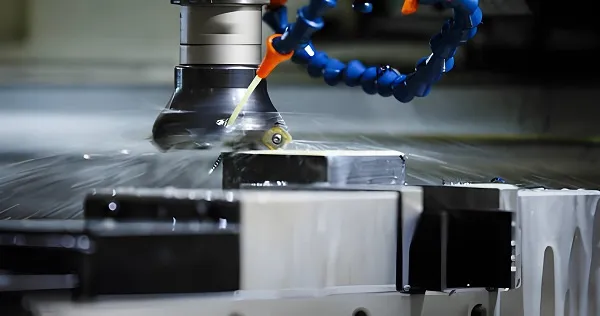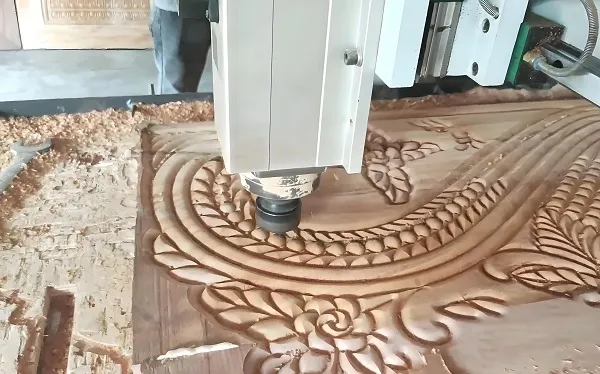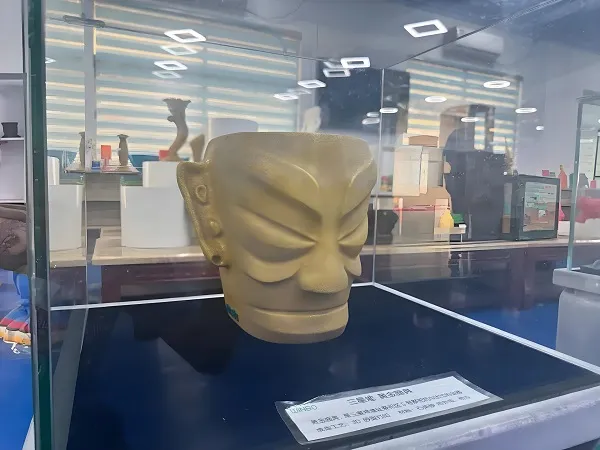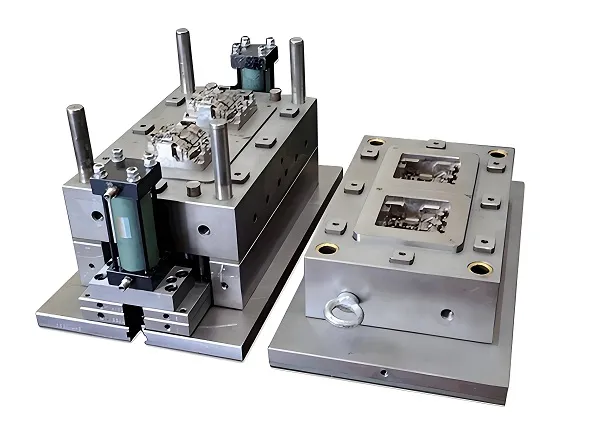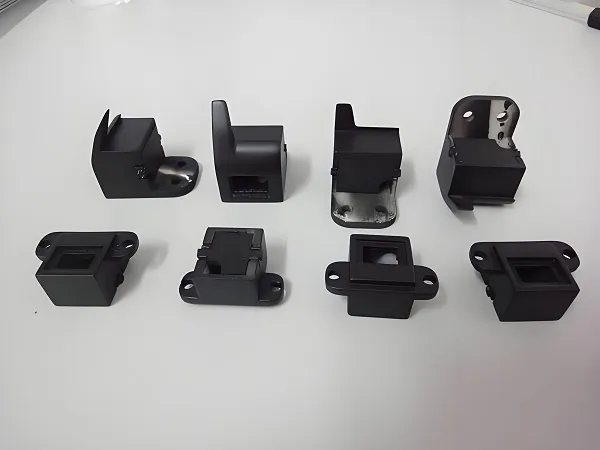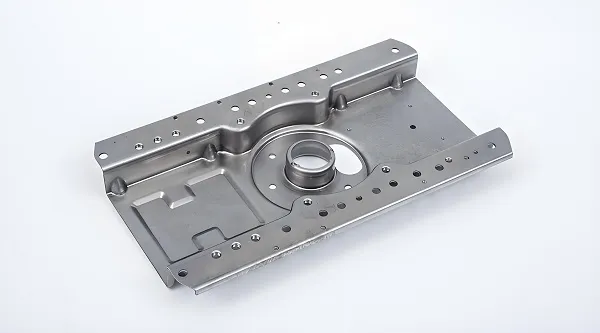Custom CNC (Computer Numerical Control) plastic threading inserts have become the tool of choice for many plastics processors in the modern precision machining sector of the manufacturing industry due to their high efficiency, precision and flexibility. Today, let’s explore the unique appeal of these inserts, from the production process, processing materials to the finished product attribute data parameters, a comprehensive analysis of its outstanding performance.
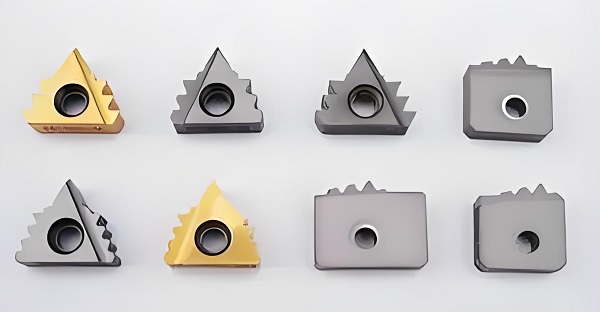
1. Production process: precise control and efficient output
CNC Programming: The production of custom CNC plastic threaded inserts begins with precise CNC programming. Utilizing advanced CAD/CAM software, engineers accurately design insert shapes, thread parameters and cutting angles according to customer needs, ensuring that every cut achieves the best results.
Precision machining: Under the precise control of CNC machine tools, carbide substrates or high-performance steels are carefully sculpted into the desired insert shape through high-precision grinding, electric discharge machining (EDM), and coating treatment. In particular, the threaded portion of the blade is machined using slow-wire cutting technology to ensure the accuracy and surface finish of the threads.
Coating technology: In order to improve the wear resistance, corrosion resistance and thermal stability of the inserts, many customized inserts will also use advanced coating technology, such as TiAlN (Titanium Aluminum Nitride), TiCN (Titanium Carbon Nitride) and so on, these coatings can significantly extend the service life of the inserts, and enhance the machining efficiency.
2.Customized CNC plastic threaded inserts processing material details:
Base material
The base material is the main component of the insert, which determines the overall strength and stiffness of the insert. Common base materials include:
Tungsten Carbide (WC): Tungsten Carbide is widely used in CNC machining for its high hardness, high strength and excellent wear resistance. It is made from tungsten carbide (WC) particles and metal binders such as cobalt (Co) by powder metallurgy. Different carbide grades have different cobalt contents and particle sizes to suit different machining needs. For example, YG6 and YG8 are commonly used carbide grades, which are suitable for processing high-strength plastics.
High-Speed Steel (HSS): HSS is a cost-effective tool material with good toughness and cutting performance. It is suitable for general low and medium speed cutting, although the wear resistance is not as good as carbide, but the price is relatively low, suitable for some occasions of cost requirements.
High-performance stainless steel: In some special applications, high-performance stainless steel may also be selected as the base material. Stainless steel has good corrosion resistance and a certain degree of hardness, but relative to carbide and high-speed steel, its cutting performance may be slightly inferior.
Coating materials
In order to improve the wear resistance, corrosion resistance and thermal stability of the insert, many customized inserts will also use coating technology. The choice of coating material has a direct impact on insert performance, and common coating materials include:
TiAlN (Titanium Aluminum Nitride): TiAlN coatings offer good wear resistance and high temperature stability, and are particularly suited for high speed cutting and machining in high temperature environments.
TiCN (Titanium Carbide Nitride): TiCN coating combines the hardness of Titanium Carbide (TiC) and the lubricity of Titanium Nitride (TiN), providing excellent cutting performance and long service life.
Other coatings: coatings such as aluminum oxide (Al₂O₃) and tungsten carbide (WC) are also widely used in CNC cutting tools to improve their comprehensive performance.
3. Principles of material selection
When choosing the machining material for customized CNC plastic threading inserts, the following factors need to be considered comprehensively:
Processing material: choose the appropriate insert material according to the type of plastic being processed, hardness, toughness and other characteristics. For example, when processing high-strength plastics, priority should be given to the selection of carbide matrix.
Processing conditions: consider the cutting speed, depth of cut, feed and other processing conditions on the impact of insert performance. When cutting at high speed, materials with good high temperature stability and wear resistance should be selected.
Cost-effectiveness: under the premise of ensuring the quality of processing, reasonable cost control, select cost-effective materials.
Environmental protection requirements: With the improvement of environmental protection awareness, it is becoming more and more important to choose materials that meet environmental protection standards.
4. Finished product attribute data parameters
Size specifications: According to the specific application requirements, the diameter of the custom blade can range from a few millimeters to tens of millimeters, length, thread angle, pitch and other parameters can be customized according to customer requirements. For example, the size of a common customized insert is 12mm in diameter, 30mm in length, 1.5mm in pitch, and 30° in helix angle.
Hardness and toughness: After precision machining and special heat treatment, the hardness of the insert matrix can reach HRA 88-92, while maintaining good toughness to ensure that it is not easy to break in the high-speed cutting process.
Cutting efficiency: Compared with traditional inserts, customized CNC plastic threading inserts can increase cutting efficiency by 20%-30% under the same conditions, greatly reducing machining cycle time.
Service life: Thanks to advanced coating technology and optimized design, the service life of custom inserts is significantly improved, usually up to 2-3 times that of ordinary inserts, reducing the frequency of replacement and saving costs.
Surface quality: the surface finish of the processed plastic products is high and the grain is clear, which meets the high quality production standards.
To summarize, custom CNC plastic threading inserts provide strong support for modern manufacturing with their superb production process, diversified machining material choices, and excellent finished product attribute data parameters. Whether it’s complex plastic parts processing or high-precision thread manufacturing, custom inserts can help companies improve productivity, reduce costs and win market opportunities with their unique advantages.
Custom CNC Plastic Threading Inserts Service FAQ
What is the service flow of customized CNC plastic threaded inserts?
Answer:
The service flow of customized CNC plastic threaded inserts usually includes the following steps:
Demand communication: Customers first contact with suppliers to clarify their processing needs, including the size, shape, material and precision requirements of the required inserts.
Design Confirmation: The supplier carries out the preliminary design according to the customer’s demand, and provides the design drawings or 3D model for the customer to confirm. Customers can modify the design until they are satisfied.
Quotation and order: After both parties confirm the design is correct, the supplier will provide a detailed quotation. The customer confirms the price and places the order, and pays the deposit.
Production and Processing: The supplier carries out production and processing according to the confirmed design drawings to ensure the quality and precision of the blades.
Quality Inspection: During and after the production process, the supplier will carry out strict quality inspection on the blades to ensure that the products meet the customer’s requirements.
Delivery and after-sales service: the blades are delivered to the customers through logistics, and the customers pay the final payment after acceptance. The supplier provides after-sales service, including instruction of use, questions and answers, etc.
What are the main materials of CNC plastic threading inserts?
Answer:
The main materials of CNC plastic threading inserts include cemented carbide (such as tungsten steel), ceramics, high-speed steel and so on. Different materials have different characteristics and scope of application:
Cemented carbide: with high hardness, high wear resistance and high red hardness, it is suitable for high-speed cutting and cutting of difficult-to-machine materials.
Ceramics: very high hardness and wear resistance, but poor toughness, suitable for high-speed, high-precision dry cutting and semi-dry cutting.
High-speed steel: has good toughness and heat resistance, suitable for general cutting, but relative to cemented carbide and ceramic, its hardness and wear resistance is lower.
When choosing the material, it needs to be determined according to the specific processing materials, processing conditions and processing requirements.
How long does it take to customize CNC plastic threading inserts?
Answer:
The time to customize CNC plastic threaded inserts varies depending on a number of factors, including the complexity of the insert, the production capacity of the manufacturer, and the preparation time of the raw material. Generally speaking, it takes several weeks to several months from design confirmation to production completion and delivery to the customer. The specific time needs to be determined after detailed communication with customers and suppliers.
How to ensure the quality of customized CNC plastic threaded inserts?
Answer:
To ensure the quality of Customized CNC Plastic Threaded Inserts, suppliers usually take the following measures:
Strict material selection: choose high quality raw materials for production.
Precision machining: advanced CNC machining equipment and process are used for precision machining to ensure the size and shape accuracy of the inserts.
Strict Inspection: Carry out multiple quality inspections during and after the production process, including size inspection, hardness inspection, wear resistance inspection and so on.
Continuous improvement: according to customer feedback and market demand, we constantly optimize the production process and product design to improve product quality.
How to calculate the cost of customized CNC plastic threaded inserts?
Answer:
The cost of customized CNC plastic threaded inserts is usually calculated based on the following factors:
Size and shape of the insert: the larger the size and the more complex the shape, the higher the production cost.
Material chosen: Prices vary greatly from material to material, with carbide and ceramic materials usually more expensive than HSS.
Quantity of production: Mass production can spread the fixed cost and reduce the cost per piece.
Processing accuracy requirements: the higher the accuracy requirements, the higher the production cost.
Therefore, the specific cost needs to be determined after detailed communication between the customer and the supplier. Suppliers usually provide a detailed quotation, including the breakdown of each cost and the total price.

